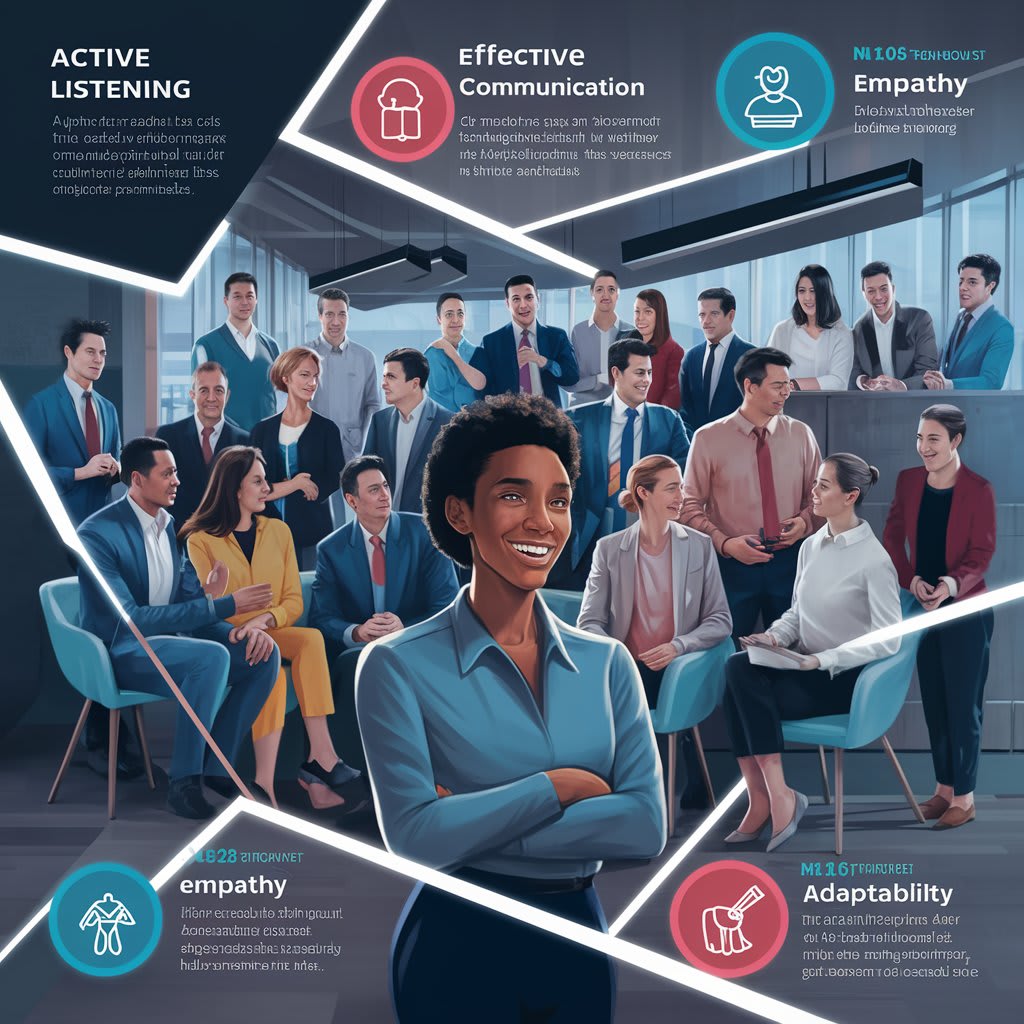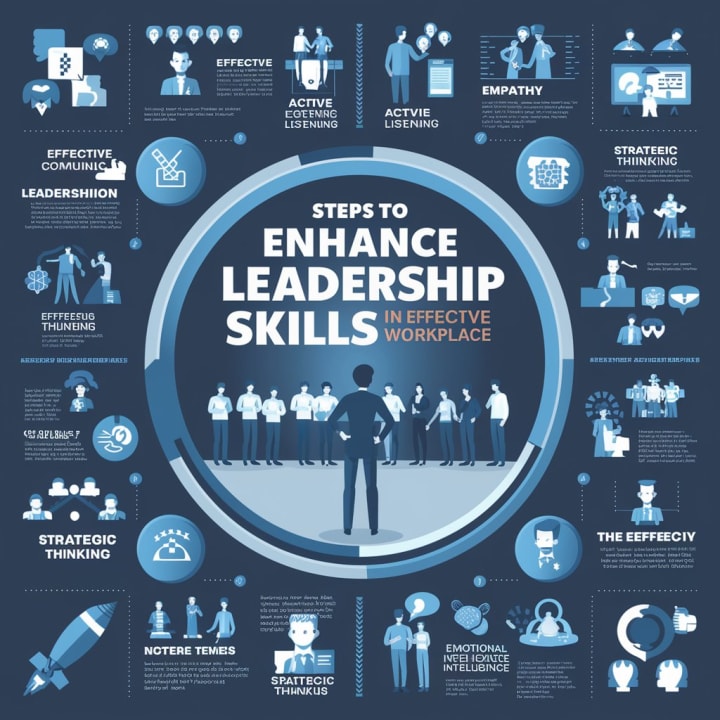How to Enhance Your Leadership Skills in the Workplace
Become a More Effective and Inspiring Leader

Effective leadership is essential for the success of any organization. Whether you are in a managerial role or aspiring to be one, developing strong leadership skills can significantly impact your career and the overall productivity of your team.
This article provides a comprehensive guide on how to enhance your leadership skills in the workplace and become a more effective and inspiring leader.
Understanding Leadership
Before diving into the strategies to enhance leadership skills, it’s crucial to understand what leadership entails. Leadership is not just about holding a position of power; it’s about influencing and guiding others towards achieving common goals. An effective leader motivates, inspires, and helps team members grow while ensuring that the organization’s objectives are met.
Key Characteristics of Effective Leaders
To enhance your leadership skills, it’s important to embody the characteristics that define effective leaders:
1. **Communication Skills**: Effective leaders communicate clearly and concisely. They listen actively and provide constructive feedback.
2. **Emotional Intelligence**: Understanding and managing your emotions, as well as those of others, is crucial for effective leadership.
3. **Vision**: Great leaders have a clear vision and can convey it to their team. They set clear goals and help the team understand their role in achieving them.
4. **Integrity**: Trustworthiness and ethical behavior are fundamental to leadership. Leaders with integrity build trust and respect among their team.
5. **Adaptability**: The ability to adapt to changing circumstances and remain calm under pressure is a key trait of successful leaders.
6. **Decisiveness**: Effective leaders make informed decisions swiftly and confidently.
7. **Empathy**: Understanding and addressing the needs and concerns of team members fosters a positive work environment.

Strategies to Enhance Leadership Skills
1. Develop Self-Awareness
Self-awareness is the foundation of effective leadership. Understanding your strengths and weaknesses allows you to improve continuously. Reflect on your leadership style, seek feedback from peers and subordinates, and be open to constructive criticism.
**Action Steps:**
- Conduct self-assessments and personality tests.
- Keep a journal to reflect on your daily interactions and decisions.
- Seek feedback from trusted colleagues and mentors.
2. Improve Communication Skills
Effective communication is critical for leadership success. It involves not only speaking and writing clearly but also listening actively and empathetically.
**Action Steps:**
- Practice active listening by paying full attention to the speaker and providing feedback.
- Improve your public speaking skills through courses or practice sessions.
- Use clear and concise language in written communications.
3. Build Emotional Intelligence
Emotional intelligence (EQ) is the ability to understand and manage your emotions and those of others. High EQ leads to better interpersonal relationships and decision-making.
**Action Steps:**
- Practice mindfulness to become more aware of your emotions.
- Develop empathy by putting yourself in others’ shoes.
- Learn conflict resolution techniques to handle disputes effectively.
4. Set Clear Goals and Vision
Having a clear vision and setting achievable goals is essential for guiding your team. A shared vision fosters unity and motivation among team members.
**Action Steps:**
- Define your vision and communicate it effectively to your team.
- Set SMART (Specific, Measurable, Achievable, Relevant, Time-bound) goals.
- Regularly review and adjust goals as needed.
5. Lead by Example
Leading by example is one of the most effective ways to inspire and motivate your team. Demonstrate the behavior and work ethic you expect from your team members.
**Action Steps:**
- Maintain high standards of integrity and professionalism.
- Show commitment and dedication to your work.
- Be punctual and meet deadlines consistently.

6. Foster a Positive Work Environment
A positive work environment boosts morale, productivity, and overall job satisfaction. Encourage collaboration, recognize achievements, and provide support when needed.
**Action Steps:**
- Promote open communication and collaboration.
- Recognize and reward team members’ achievements.
- Provide opportunities for professional development.
7. Develop Decision-Making Skills
Effective leaders make informed and timely decisions. This involves gathering relevant information, analyzing options, and considering the potential impact of each decision.
**Action Steps:**
- Gather and analyze relevant data before making decisions.
- Weigh the pros and cons of different options.
- Consider the long-term impact of your decisions.
8. Learn to Delegate
Delegation is essential for effective leadership. It empowers team members, fosters trust, and allows leaders to focus on high-priority tasks.
**Action Steps:**
- Identify tasks that can be delegated to others.
- Choose the right team members for specific tasks based on their strengths and skills.
- Provide clear instructions and support to ensure successful task completion.
9. Continuously Improve
Leadership is a continuous journey of growth and development. Stay updated with the latest trends, seek out learning opportunities, and be open to new ideas and approaches.
**Action Steps:**
- Attend leadership training programs and workshops.
- Read books and articles on leadership and management.
- Seek mentorship and guidance from experienced leaders.
10. Build Strong Relationships
Building strong relationships with your team, peers, and superiors is crucial for effective leadership. It fosters trust, collaboration, and mutual respect.
**Action Steps:**
- Take the time to get to know your team members on a personal level.
- Show appreciation for their efforts and contributions.
- Build a network of supportive colleagues and mentors.
Implementing Leadership Skills in the Workplace
Once you have developed these leadership skills, it’s important to implement them effectively in the workplace:
1. Team Meetings: Use team meetings to communicate your vision, set goals, and address any concerns. Encourage open dialogue and active participation.
2. One-on-One Meetings: Regular one-on-one meetings with team members help to build strong relationships, provide personalized feedback, and address individual needs.
3. Performance Reviews: Conduct regular performance reviews to assess progress, provide constructive feedback, and set future goals.
4. Conflict Resolution: Handle conflicts promptly and fairly. Use your emotional intelligence and conflict resolution skills to mediate disputes and find mutually beneficial solutions.
5. Professional Development: Encourage and support the professional development of your team members. Provide opportunities for training, mentoring, and career advancement.

Measuring Leadership Success
To ensure continuous improvement, it’s important to measure the success of your leadership efforts:
1. Feedback: Regularly seek feedback from your team, peers, and superiors. Use this feedback to identify areas for improvement.
2. Performance Metrics: Track performance metrics such as team productivity, employee engagement, and goal achievement.
3. Self-Assessment: Conduct self-assessments to reflect on your leadership performance and identify areas for growth.
4. Team Morale: Monitor team morale and job satisfaction. High morale and low turnover rates are indicators of effective leadership.
Conclusion
Enhancing your leadership skills in the workplace is a continuous journey that requires self-awareness, communication, emotional intelligence, and a commitment to growth.
By developing these skills and implementing them effectively, you can become a more effective and inspiring leader. Remember to lead by example, foster a positive work environment, and continuously seek opportunities for improvement.
Effective leadership not only benefits your career but also contributes to the success and productivity of your team and organization. Embrace the journey of leadership development and strive to be the best leader you can be.
#LeadershipSkills, #EffectiveLeadership, #WorkplaceLeadership, #LeadershipDevelopment, #CommunicationSkills, #EmotionalIntelligence, #TeamBuilding, #ProfessionalDevelopment, #LeadershipSuccess, #ContinuousImprovement
About the Creator
Sherif Saad
Hey there, fellow word enthusiasts! I'm Sherif, and I'm thrilled to embark on this creative journey with you
I'm a passionate writer with a love for storytelling that knows no bounds diving into the world of words.
Enjoyed the story? Support the Creator.
Subscribe for free to receive all their stories in your feed. You could also pledge your support or give them a one-off tip, letting them know you appreciate their work.






Comments (2)
nice
good